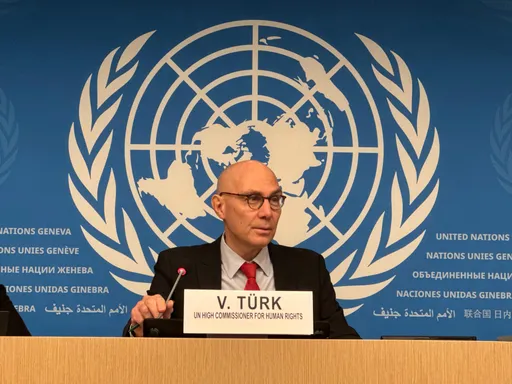Turkey's President Erdogan says it will launch a follow-up operation in Syria’s YPG-held Manbij, after its operation in Afrin is completed.
YPG and Turkish-backed Free Syrian Army (FSA) have already begun to clash in the rural areas of Manbij, according to Anadolu Agency citing local sources.
Why Manbij?
Afrin is located at Syria’s northern border with Turkey, and Manbij is 30 km south of Turkish border. The territory between the Turkish border and Manbij is controlled by the FSA. And both Afrin and Manbij are currently controlled by the YPG, the PKK’s Syrian affiliate, which is listed as a terrorist organisation by Turkey, the US and the European Union.
1 - The location of Manbij is crucial for Turkey
Manbij is one of the several areas that were captured from Daesh in 2016 by the Syrian Democratic Forces (SDF), a YPG-dominated ground force that was created by the USA.
The YPG had declared its desire for an autonomous region in Syria’s north since the beginning of the Syrian conflict. As the war progressed, the YPG’s land-grabs overtook large swaths of land in northern Syria with the military support of the US and the diplomatic backing of Russia.
But during the fight to take Manbij from Daesh, Turkey reminded the US of the need to prevent the YPG from establishing a corridor along its border. Turkey’s biggest security concern is the YPG carving out an autonomous territory that poses a threat to the nation.
In the same month, along with the FSA, Turkey began the Operation Euphrates Shield, its first military operation in northern Syria to defeat Daesh.
The operation held strategic importance, as it took place between Manbij and Afrin and broke apart a possible YPG-controlled corridor that would have posed a threat to Turkish national security.
2 - The US made assurances that the YPG mission creep wouldn’t happen—but it has
Former US President Barack Obama had once promised Turkey that the YPG would not take control of Manbij after defeating Daesh, and that the YPG would withdraw to the east of the Euphrates river after the fight had concluded.
“We have made it absolutely clear to the elements that were part of the Syrian Democratic Forces, the YPG that participated, that they must move back across the river. They cannot, will not, and under no circumstances get American support if they do not keep that commitment, period,” Former Vice President Joe Biden also reiterated the US’ promise during a visit to Ankara in August, 2016.
That statement didn’t hold for long.
And recently, the US-led coalition announced plans to set up a 30,000-strong border force composed of YPG members, along Syria’s border with Iraq and Turkey. It’s the same force that Turkey regards as a threat to its national security. The Pentagon said the aim of the new army was to protect YPG-held territory along Syria’s northeast border with Turkey from Daesh. But Daesh had already mostly been defeated in Syria and no longer retained a presence there; the US’ reason for the YPG mission there had become redundant.
After the US promised SDF troop withdrawal from Manbij, it pressed on against Daesh in Raqqa, repeatedly promising that its armed support of the YPG would cease upon the defeat of Daesh. That was not the case.
3 - US-Turkey interests diverge
Up until 2014, Turkey and the US worked together on the Syrian battlefield. But then the US began to arm the YPG instead of the FSA, the main group that opposed the Assad regime. In 2015 the US went further, founding the SDF to fight against Daesh, in a move that angered Turkey.
Refusing to fight alongside a group affiliated with the PKK—a group that has been waging an armed campaign against Turkey since 1984—Turkey continued its support of the FSA.
4 - The YPG began to take control of the cities—and didn’t just limit its goal to fighting Daesh
Unlike the border area of Afrin, which has been controlled by the YPG since 2012, Manbij didn’t become a YPG self-declared canton until after the YPG had defeated Daesh in August 2016.
The administration of the Arab-dominated city, however, was left to a council co-chaired by a prominent YPG figure; the YPG had not withdrawn from the city.
5 - Will the Manbij operation differ from Afrin?
Turkey’s follow-up operation in Manbij is expected soon after the one in Afrin. But unlike Afrin, Turkey must grapple with different parties to conduct operations in the area, as the international parties involved are different this time.
Russia has had troops in Afrin alongside the YPG since 2015, but withdrew and relocated them to Tel Rifat for "safety reasons" on the first day of the Turkish operation, opening the way for Turkey.
Russia occasionally backed the YPG, and had previously created a buffer zone to forestall Turkey from attacking the YPG. Upon the Russian withdrawal, the YPG claimed that Russia’s latest move was a "betrayal". Shortly after, Turkey’s Anadolou Agency reported local sources as saying the YPG had freed Daesh prisoners to fight against Turkey in Afrin.
The US, however, has retained the upper hand on the northeast of the country, including Manbij. But it is not the only player in the northeast.
Iran, a US foe and longtime supporter of the Assad regime, also has militias in the area that have fought against Daesh, most recently in the southeastern city of Deir Ezzor. Keen to create a corridor between Bagdad, Tehran, Lebanon and Syria, Iran has deployed thousands of Shia fighters in the south, according to reports from Fars News Agency, affiliated with Iran’s Revolutionary Guard Corps.
For the US, the Iranian militia presence in Syria is seen as a precursor to greater and longer-term influence along the Syria-Iraq border. In the US view, ceding YPG control in Manbij could mean the greater encroachment of Iranian militas.
The existence of the Iranian militias in the southeast of Afrin, on the other hand, is not the US' main concern.























